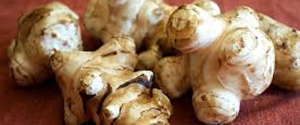 A sunchoke is a tuber, or an underground vegetable, like a cross between a rutabaga and a potato, with the flavor of sunflower seeds and the crunch of water chestnuts. It’s also called a Jerusalem artichoke, even though it is not an artichoke at all, and it has nothing whatsoever to do with Jerusalem. They are closely related to the sunflower. Native Americans were eating sunchokes centuries before the Europeans arrived in the 1500s. In fact, the Europeans thought sunchokes were poisonous at first. Once they got over that, they have enjoyed its nutty flavor in many dishes.
A sunchoke is a tuber, or an underground vegetable, like a cross between a rutabaga and a potato, with the flavor of sunflower seeds and the crunch of water chestnuts. It’s also called a Jerusalem artichoke, even though it is not an artichoke at all, and it has nothing whatsoever to do with Jerusalem. They are closely related to the sunflower. Native Americans were eating sunchokes centuries before the Europeans arrived in the 1500s. In fact, the Europeans thought sunchokes were poisonous at first. Once they got over that, they have enjoyed its nutty flavor in many dishes.
Jerusalem artichokes are easy to prepare. You can cook them just like you would a potato: roast, boil, saute, bake or steam. You can leave the skin on or peel it off — up to you, but make sure you wash them well. The surprising thing about these little roots is that you can also eat them raw. They add a great texture to salads, salsas, marinades and stir-frys, in small pieces or grated.
Sunchokes contain lots of vitamin C and a substance called inulin. It is a type of starch that can be well tolerated by people with diabetes because it breaks down into fructose instead of glucose. This makes sunchokes a good substitute for potatoes for diabetics.
Nutty and subtly sweet, steamed or roasted sunchokes can be used in place of artichoke hearts in most recipes. Local up your favorite baked artichoke dip, or artichoke and spinach pasta recipe, with sunchokes!
